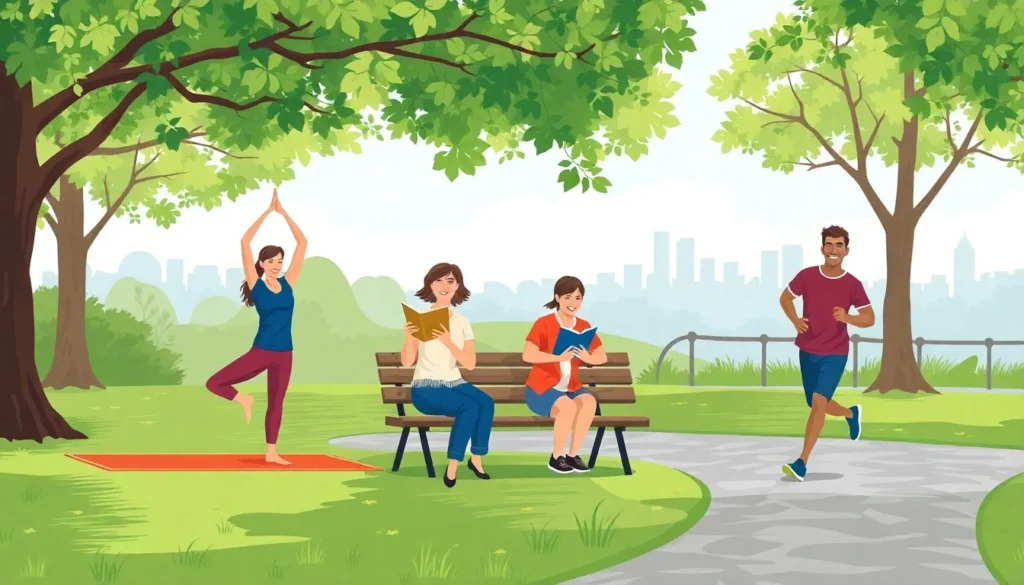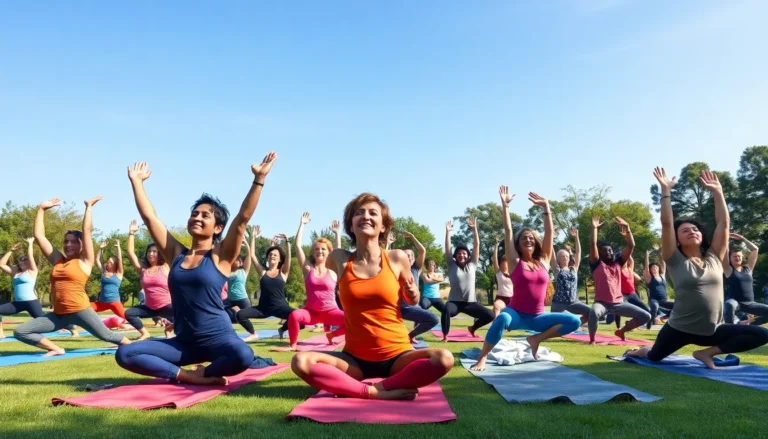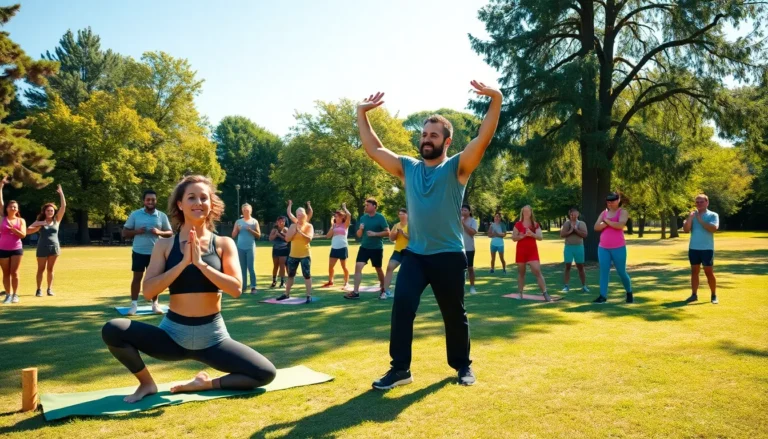Table of Contents
ToggleIn a world that often feels like a never-ending race, self-care isn’t just a luxury—it’s a necessity. Picture this: you’re juggling work deadlines, family commitments, and the occasional existential crisis. Amidst all this chaos, taking a moment for yourself might seem selfish, but it’s actually the secret sauce to thriving in life.
Understanding Self Care
Self-care encompasses activities that promote physical, mental, and emotional well-being. Incorporating self-care into daily routines proves essential for everyone, regardless of age or lifestyle. Recognizing personal needs forms the foundation of effective self-care practices.
Engaging in physical activities, such as exercise or walking, enhances overall health and reduces stress. Managing stress through methods like meditation or mindfulness fosters mental clarity. Social interactions and healthy relationships contribute significantly to emotional health.
Experts suggest that developing awareness of one’s state encourages better self-care decisions. Identifying specific needs, such as sleep, nutrition, or leisure, allows individuals to tailor their self-care routines effectively. Regularly reassessing one’s well-being fosters a proactive approach.
Practicing self-care leads to increased productivity and resilience in facing challenges. People who prioritize self-care often demonstrate improved focus and creativity in their personal and professional lives. Incorporating structured time for relaxation and hobbies reduces feelings of burnout.
Developing healthy boundaries further strengthens the ability to engage in self-care. Balancing responsibilities with personal time ensures that individuals maintain their energy levels. Encouragement from peers and communities reinforces commitment to self-care routines.
Making self-care a priority enhances both individual and collective well-being. Engaging in regular self-care not only benefits the individual but also creates a positive ripple effect within families and communities. Prioritizing self-care contributes to a more fulfilling and rewarding life experience.
Breaking the Stigma

Self-care isn’t exclusive to a particular group; it’s essential for everyone. Understanding this connects individuals to their unique needs while fostering a culture of support.
Common Misconceptions
Many individuals perceive self-care as a luxury limited to those with ample time and resources. This notion obscures the reality that self-care is a basic human necessity. Often, people think self-care equates to indulgence like spa days or treats. In fact, it can involve simple actions, such as taking a walk or enjoying a quiet moment. The misconception that self-care is selfish deters individuals from incorporating it into their lives. Prioritizing personal health and wellness not only benefits oneself but also enhances relationships and community well-being.
The Importance of Inclusivity
Inclusivity in self-care practices ensures that everyone’s voice is heard. Creating space for diverse needs fosters understanding and acceptance among individuals from varying backgrounds. Recognizing that self-care looks different for each person helps dismantle barriers. For example, some may find solace in creative outlets while others prefer physical activities. Acknowledging these differences validates all experiences and encourages collective growth. When everyone participates in self-care, communities exhibit greater resilience and joy.
Different Forms of Self Care
Self-care manifests in various forms, each serving unique purposes for individuals. Understanding these forms helps tailor self-care practices to personal needs.
Physical Self Care
Physical self-care includes activities that promote physical health and well-being. Engaging in regular exercise enhances cardiovascular health and boosts energy levels. Nutrition plays a vital role; a well-balanced diet supports bodily functions and strengthens the immune system. Prioritizing sleep also contributes significantly to overall wellness. Those who establish consistent sleep patterns experience improved focus and productivity. Routine check-ups ensure preventive care and early detection of potential health issues. Taking time for personal grooming additionally fosters a sense of self-worth, influencing confidence.
Emotional Self Care
Emotional self-care focuses on managing feelings and emotional well-being. Recognizing personal emotions empowers individuals to process and cope with stress effectively. Journaling serves as a productive outlet for expressing thoughts and feelings. Practicing mindfulness meditation reduces anxiety and encourages self-reflection. Developing emotional resilience through healthy coping mechanisms enhances overall mental health. Connecting with supportive friends or family members provides valuable reassurance during tough times. Seeking professional help, such as therapy, can also guide emotional growth and healing.
Social Self Care
Social self-care emphasizes the importance of nurturing relationships and social connections. Spending quality time with loved ones fosters deeper bonds and emotional support. Joining community groups or clubs encourages social engagement and cultivates shared interests. Setting boundaries in relationships allows individuals to maintain balance and protect well-being. Making an effort to reconnect with old friends can enrich social experiences and provide a sense of belonging. Volunteering in local organizations strengthens community ties and promotes a sense of purpose. Establishing a strong social network enhances overall life satisfaction and resilience.
Benefits of Practicing Self Care
Practicing self-care enhances overall well-being across multiple dimensions. Regular physical activity, for instance, boosts energy levels and promotes better health. Increased mental clarity often results from mindfulness practices and stress management techniques. Emotional stability thrives through the establishment of healthy relationships and support systems.
Enhanced productivity becomes a significant benefit when self-care routines take precedence. Resilience builds as individuals engage in activities that nourish both body and mind. Focus improves, leading to heightened creativity, which can manifest in personal and professional endeavors.
Additionally, setting healthy boundaries fosters better balance between responsibilities and personal time. Individuals increasingly report feeling less overwhelmed when they prioritize self-care activities. Priority given to self-care has a positive ripple effect; families flourish, and communities grow stronger as members engage in healthy practices.
Simple actions can lead to profound changes. Taking time for walks or indulging in quiet moments contributes positively to emotional health. Understanding that self-care is not a luxury but a necessity helps dispel the stigma surrounding it. By embracing the concept that self-care looks different for everyone, individuals create inclusive environments that respect diverse needs.
Different forms of self-care play distinct roles in enhancing life satisfaction. Physical self-care involves engaging in regular exercise, eating nutritious foods, and ensuring quality sleep. Emotional self-care may include journaling to process thoughts and feelings or seeking professional support when necessary. Social self-care emphasizes the importance of nurturing relationships with loved ones and environments foster community engagement. Prioritizing various self-care aspects ultimately leads to increased resilience and satisfaction in life.
Tips for Incorporating Self Care
Incorporating self-care into daily routines strengthens overall well-being. Schedule regular exercise, as engaging in physical activities enhances health. Prioritize a balanced diet, focusing on nutrition that fuels the body and mind.
Practice mindfulness to manage stress effectively. Simple techniques, like deep breathing or meditation, foster mental clarity and emotional stability. Keep a journal to explore thoughts and feelings, which can promote emotional well-being and self-awareness.
Nurturing social connections remains vital. Spend quality time with loved ones to build supportive relationships. Join community groups to expand social networks and enhance feelings of belonging.
Establish boundaries to maintain personal time. Create a clear division between work responsibilities and personal life to recharge and restore energy levels. Use weekends or evenings for self-care activities that rejuvenate the spirit.
Explore self-care hobbies that bring joy and relaxation. Whether it’s painting, reading, or gardening, engaging in enjoyable activities contributes to overall happiness. Experiment with different practices to discover what resonates best with individual preferences.
Evaluate personal needs regularly. Reflect on physical, emotional, and social well-being to identify areas requiring attention. Regular assessments enable tailoring self-care practices to specific changes in circumstances or feelings.
Encouragement from others reinforces commitment. Share self-care goals with friends or family to build accountability. Supportive conversations can motivate continued practice, ensuring self-care remains a priority in life.
Self-care is a vital practice for everyone regardless of their circumstances. By prioritizing personal well-being individuals can enhance their overall health and happiness. Embracing self-care fosters resilience and strengthens relationships within families and communities.
It’s essential to recognize that self-care is not a luxury but a necessity that looks different for each person. Simple actions can lead to significant improvements in life satisfaction. By making self-care a priority individuals contribute to a more vibrant and supportive environment for themselves and others.
Ultimately the journey of self-care is about understanding personal needs and taking actionable steps toward a healthier, more fulfilling life.







